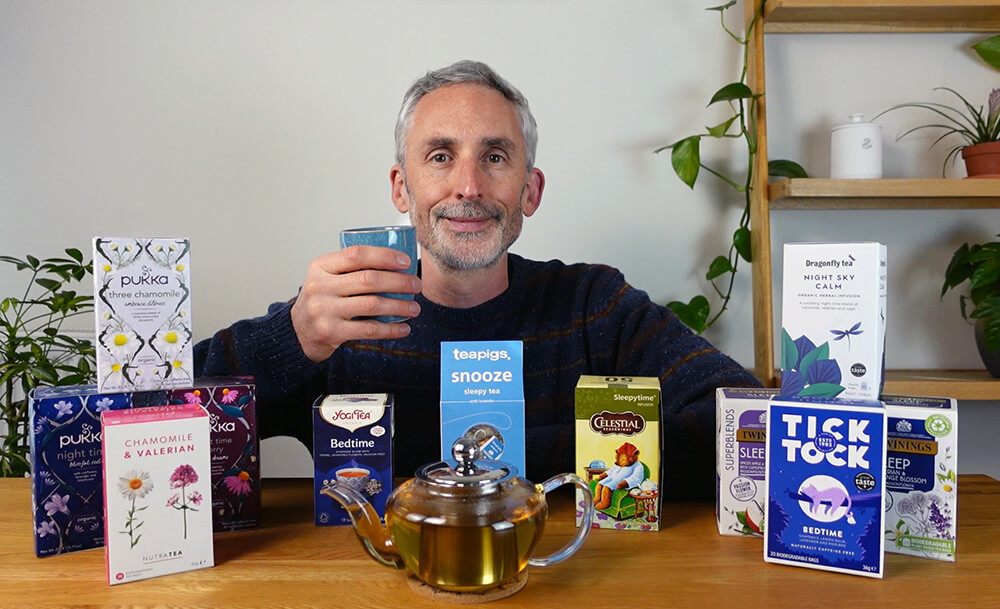
In the photo above, you can see some of the herbal teas I bought and tested during the last month. If the saying ‘you are what you eat’ is to be believed, I must be at least 30% chamomile and valerian by now!
If you spend much time with us Brits, you’ll soon discover that an important step in dealing with many of life’s problems is to put the kettle on.
As well as being a reliable friend that accompanies us in both the good and the bad times, can tea really help us sleep better though? Or is it just the placebo effect and taking some time out to relax that does the trick?
Personally, no herbal tea I’ve ever tried has magically knocked me out if I wasn’t already tired. In reality, I choose to drink them for three main reasons: they don’t contain caffeine, they taste good, and I find they mark a moment in the evening when I intentionally decide to slow down and start unwinding before going to bed.
In this article, I’ll start off by sharing my thoughts on twelve ready-made teas, which includes some classics I’ve drunk for many years. After that, I’ll take a look at the evidence they work, along with some reader suggestions of even more teas to try.
Contents
- 12 teas I bought and tried
- What evidence is there that tea might help you sleep?
- Teas recommended by previous readers
12 teas I bought and tried
How I decided on this list
I’ve been drinking some of these teas for several years anyway, so they were easy includes. To broaden the selection though, I picked up a few I hadn’t previously tried from Sainsburys and Waitrose supermarkets in the UK, and also looked online to see what was currently popular.
My partner and I spent a month drinking our way through the twelve teas, drinking two cups of each tea on two consecutive nights. We then spent a week tasting all of them at different times during the day to see how the flavours compare.
I know it’s always tempting to see lists like this as a ‘number 1 must be the best’ recommendation. However, neither my partner or I found any of them to be noticeably more relaxing than the others. Don’t get me wrong – we both agree that relaxing on the sofa with a nice cup of tea is, well, relaxing. But none of them made us feel unexpectedly drowsy mid conversation!
So, this list has ended up being more about how much we enjoyed the taste. And as you know, taste is subjective. If number 10, 11, or 12 on the list sounds like your cup of tea, don’t be afraid to try it just because it didn’t tickle our taste buds so much.
Some ingredient spellings are different, such as camomile and chamomile. This is due to American and British differences, and I’ve listed them as they appear on the box.
Please note that all the photos in this article are my own and the exact teas I bought and tried, but the manufacturers may change the ingredients or packaging in the future.
1. Pukka Night Time Blissful Rest
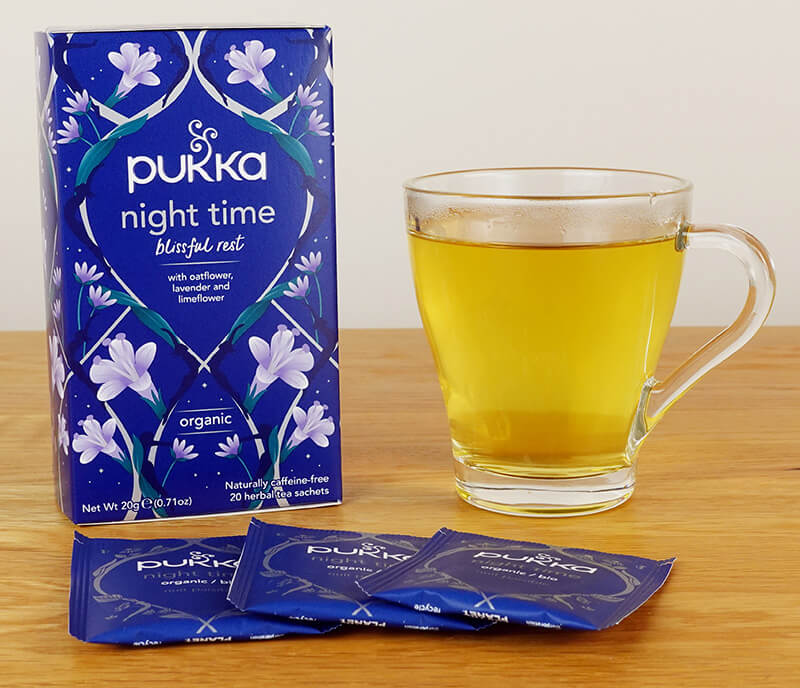
Ingredients
- Oat flowering tops (30%)
- Licorice root
- Chamomile flower
- Lavender flower (14%)
- Lime flower (10%)
- Valerian root (4.9%)
- Tulsi leaf
There are three Pukka teas on my list, but the night time blissful rest is my personal favorite. My partner had it as number three, so we both agreed it’s a lovely sleep tea.
It has a pleasant aroma, without the lavender being overpowering. The same applies to the taste, which is flowery and balanced, with a hint of sweetness. It’s the only one we tried with oat flowering tops, which perhaps contributes to the gentle taste.
We also both agreed that the taste is simply what you’d associate with a sleep tea. Nothing jarring or too strong – just a soothing tea you can sip at bedtime.
You can find it in some supermarkets and health food shops in the UK, on the Pukka website, and on Amazon globally.
2. Yogi Tea Bedtime Ayurvedic Blend
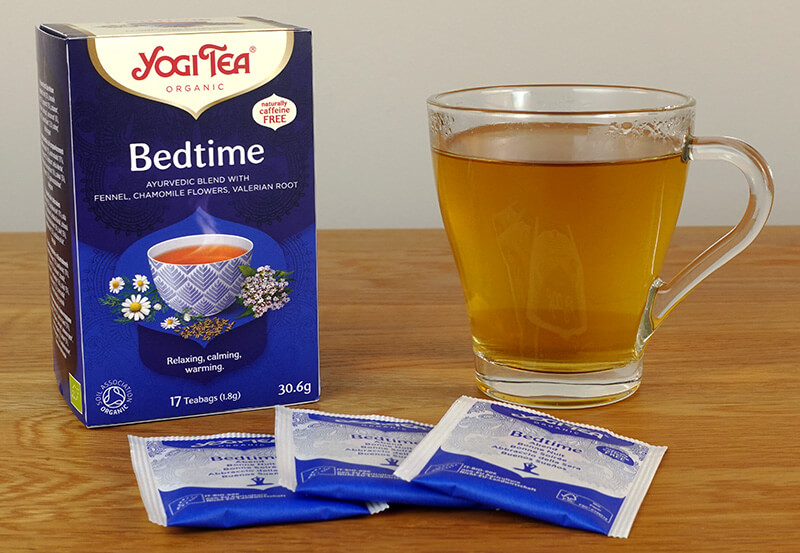
Ingredients
- Fennel (31%)
- Chamomile flowers (17%)
- Peppermint (13%)
- Cardamom
- Lemon balm
- Lemon grass
- Valerian root (6%)
- Sage (5%)
- Lavender flowers (3.5%)
- Nutmeg
With ten herbal ingredients, the taste of the Yogi Bedtime (the Ayuverdic blend version) isn’t overpowered by any of them, which is a good thing in our opinion.
It has a warm, herbal glow that we immediately associated with the thought of a calming drink. In some ways, all of our favorites had this in common: they may have herbal/flowery elements, but are balanced and enjoyable to drink.
The Yogi Tea was one that seemed to get better the longer we kept the teabag in too, with the taste developing nicely rather than becoming too strong.
I bought it on Amazon, but you can also find it on the Yogi Tea website. It may also be sold in some health food shops, such as Holland and Barrett in the UK, and stores like Walmart in the US.
3. Celestial Seasonings Sleepytime Infusion
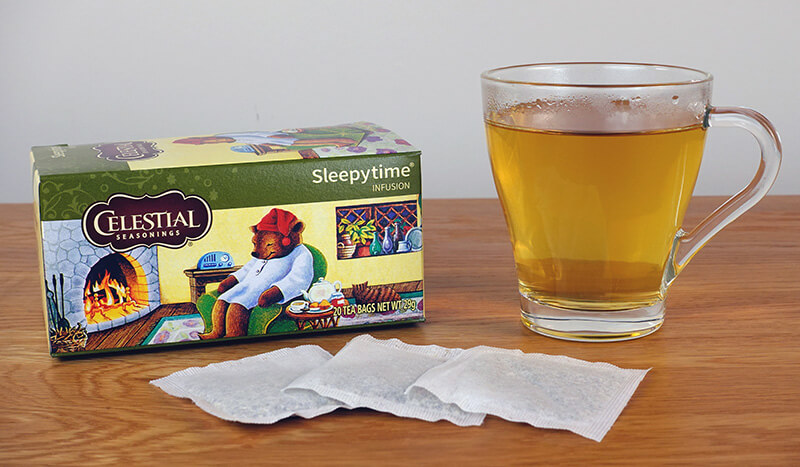
Ingredients
- Chamomile
- Spearmint
- Lemongrass
- Tilia Flowers
- Blackberry Leaves
- Orange Blossoms
- Hawthorn
- Rosebuds
When I asked my partner to describe the taste of the Celestial Seasonings Sleepytime Infusion, her reply was that “It has a rounded palette, with sweet notes.”
After wondering if she’d ever had a job as a wine critic, I realized she was right. Like the previous two, this one works well as a sleep tea because it’s well balanced, with all eight ingredients working in harmony.
The spearmint does just about poke its head through the other flavours, which we both liked. Perhaps it’s also an ideal choice if you’ve overindulged late at night and need some mint to work its digestive magic.
I bought it on Amazon. You can also find it on the Celestial Seasonings website, and in some health food shops around the world.
4. Pukka Night Time Berry
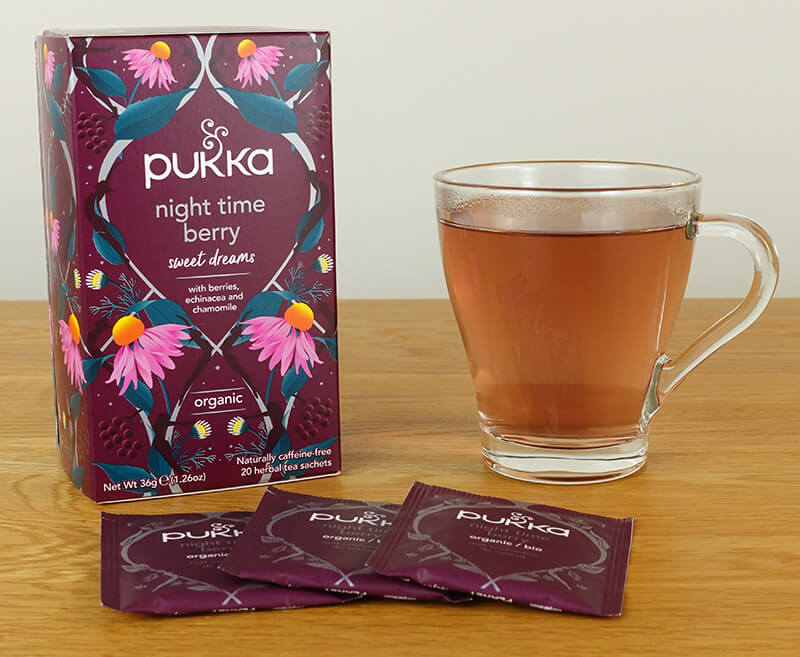
Ingredients
- Rosehip
- Hibiscus Flower
- Chamomile Flower (15%)
- Lavender Flower
- Licorice Root
- Ginger Root
- Echinacea herb (6%)
- Elderberry (4%)
- Blackcurrant Fruit (4%)
- Valerian Root
- Blueberry Flavor
- Blackcurrant Flavor
After I’d finished taking the photos of the brewed teas for this article, I realized they were all yellow/orange with one exception – Pukka Night Time Berry. The Berries in this tea give it a lovely colour, as well as a punchy aroma and taste.
As you’d expect from looking at the ingredients, it has a fruity taste that’s both sweet and slightly sour at once. Along with the berries, perhaps the Echinacea contributes to the interesting blend of sweet and sour. I’m not always a fan of herbal teas with a strong taste of berries, but this one hits the spot nicely.
You can find it in some supermarkets and health food shops in the UK, on the Pukka website, and on Amazon globally.
5. Tick Tock Bedtime
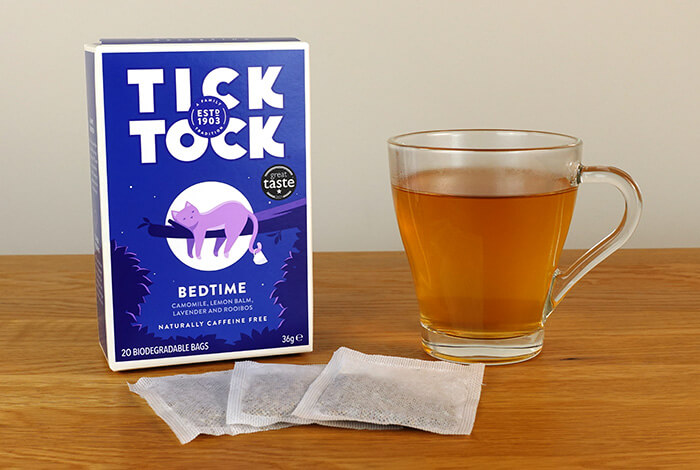
Ingredients
- Camomile (20%)
- Apple
- Rooibos (15%)
- Honeybush
- Lemon Balm (13%)
- Liquorice
- Lavender (3%)
- Aniseed
- Blackberry Leaves
I’m a huge fan of Rooibos tea and often drink it during the daytime, so I was very happy to discover a specific sleep tea with Rooibos included alongside some typical bedtime tea ingredients.
Tick Tock Bedtime has a full-bodied flavor (back to the wine descriptions!), with a herbal aroma and taste that isn’t dominated by any of the nine ingredients. I could detect the Rooibos though, which gave it a warming feel that I found relaxing to sit down and sip.
I bought it in Waitrose in the UK. It’s also on the Tick Tock Tea website, in some health food shops, other supermarkets like Morrisons, and on Amazon.
6. Twinings Sleep Spiced Apple & Vanilla
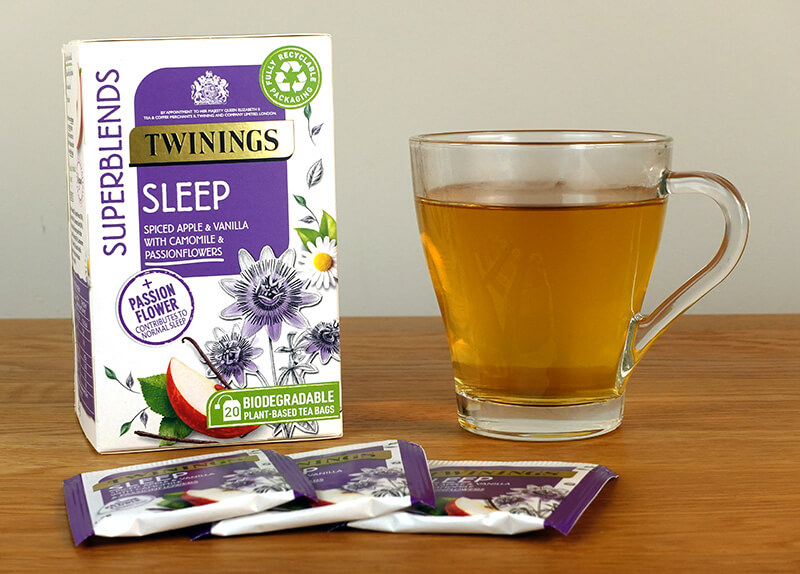
Ingredients
- Passionflower (35%)
- Apple Pieces (15%)
- Camomile (14%)
- Cinnamon Bark (10%)
- Natural apple flavouring with other natural flavourings (10%)
- Cardamom (6%)
- Cloves (6%)
- Natural vanilla flavouring with other natural flavourings (4%)
There are two versions of Twinings Sleep on my list, but we both preferred this one. It has a beautiful vanilla aroma, even though the vanilla is slightly more subtle in the taste. Perhaps that’s because the spiced edge created by the Apple, cardamon, cinnamon, and cloves is so apparent.
Relaxing on the sofa while drinking this tea on a cold night in January just felt right to us. The combination of sweetness and warming spice make it a perfect sleep tea for those long winter nights.
I bought it in Sainsburys supermarket, and it’s also sold in other supermarkets in the UK as it’s a popular bedtime tea. You can also find it on the Twinings website and on Amazon.
7. Pukka Three Chamomile
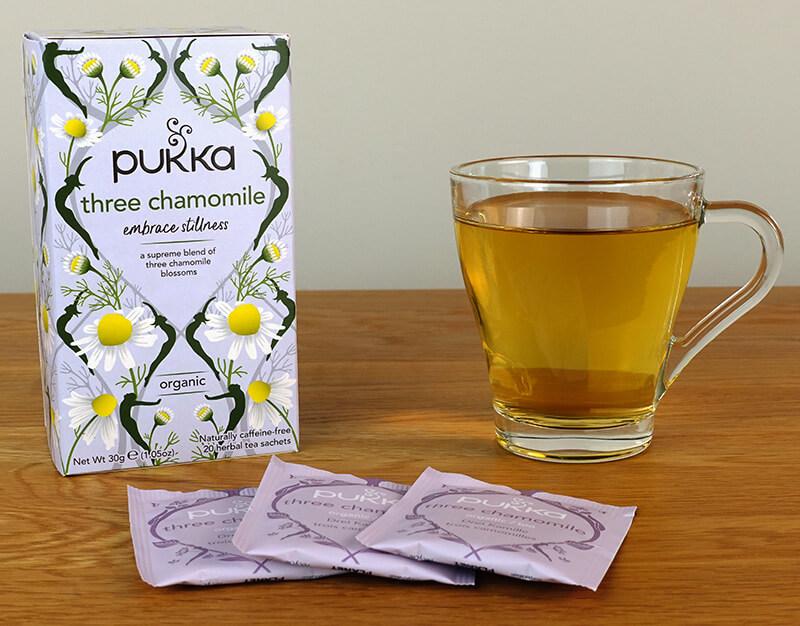
Ingredients
- African chamomile flower (70%)
- Egyptian chamomile flower (20%)
- European chamomile flower (10%)
If you just want a straight up chamomile tea without other ingredients, the Pukka Three Chamomile is the one we recommend.
We’ve both tried various chamomile-only teas over the years, but this one from Pukka stands out for its intense flavor. It’s also interesting that it contains a blend of African, Egyptian, and European chamomile.
There’s not much else to say about it really – it’s just pure chamomile that you’re likely to associate with relaxation if you’re used to drinking chamomile.
You can find it in some supermarkets and health food shops in the UK, on the Pukka website, and on Amazon.
8. Clipper Snore & Peace
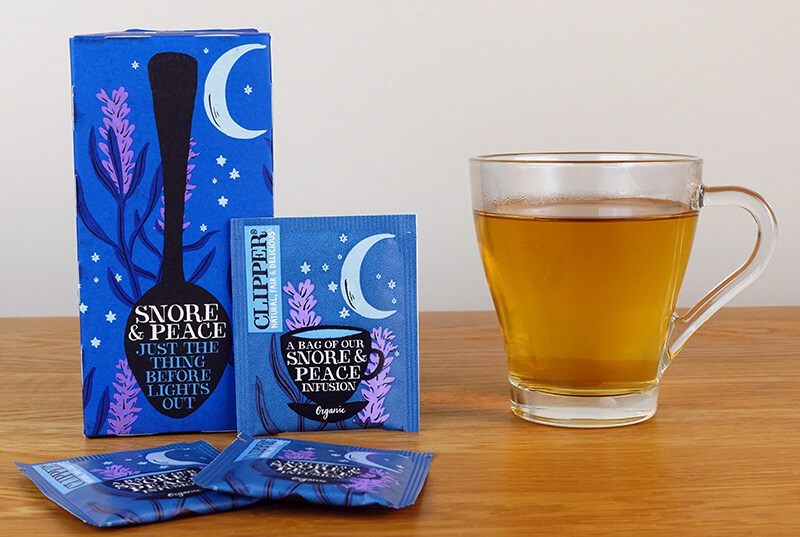
Ingredients
- Chamomile (30%)
- Lemon Balm (15%)
- Lemongrass
- Lavender (14%)
- Fennel seed
- Rosehip
- Spearmint
Clipper Snore & Peace contains a fairly sizeable percentage of lavender (14%), but manages to contain the potentially intense smell and flavor that lavender is known for.
There were a couple of teas that didn’t make this list because of what I call extreme lavenderization (the taste was so strong, I had to invent a word for it).
Snore & Peace definitely has a noticeable lavender taste, so it’s one to consider if you enjoy that. Unexpectedly, we found the lavender aroma and taste is strongest when you first pour the tea, but the other flavors catch up after a few minutes and balance it out.
I bought it in Waitrose in the UK, and it’s sold in some other supermarkets too. You can also find it on the Clipper website and Amazon.
9. Twinings Sleep Valerian & Orange Blossom
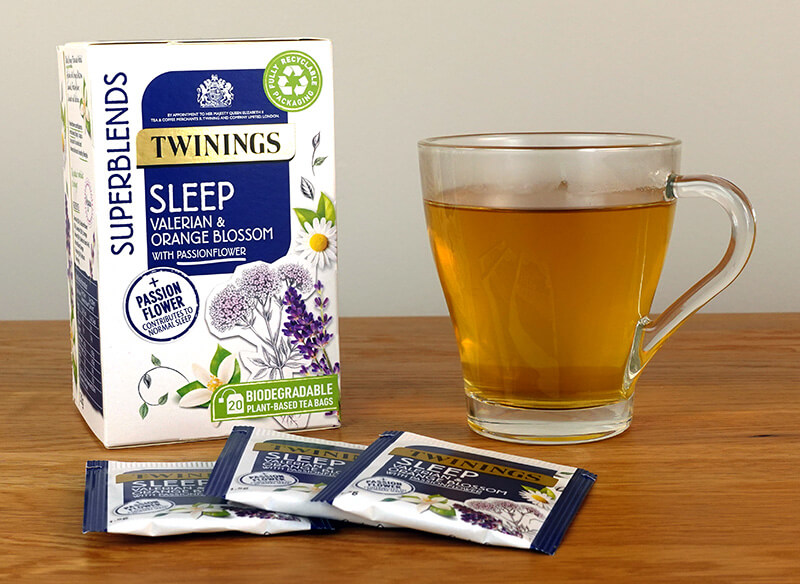
Ingredients
- Camomile (35%)
- Passionflower (35%)
- Lavender (12%)
- Orange Blossom (10%)
- Valerian Root (4%)
- Natural Blood Orange Flavouring (2%)
- Natural Flavouring
In a similar way to lavender, valerian can also dominate the taste of a herbal tea if the manufacturer allows it to. This version of Twinings Sleep manages to contain the two, even though it still has a noticeably herby taste.
The inclusion of orange blossom and orange flavouring perhaps helps counterbalance the overall feel of the tea. It has a curious combination of earthy flavors with a sweet note layered over the top.
We both thought it has a slightly more medicinal taste than the spiced apple and vanilla Twinings Sleep, but still enjoyed drinking it while relaxing before bedtime.
I bought it in Sainsburys supermarket, and it’s also sold in other supermarkets in the UK as it’s a popular bedtime tea. You can also find it on the Twinings website and on Amazon.
10. Dragonfly Tea – Night Sky Calm
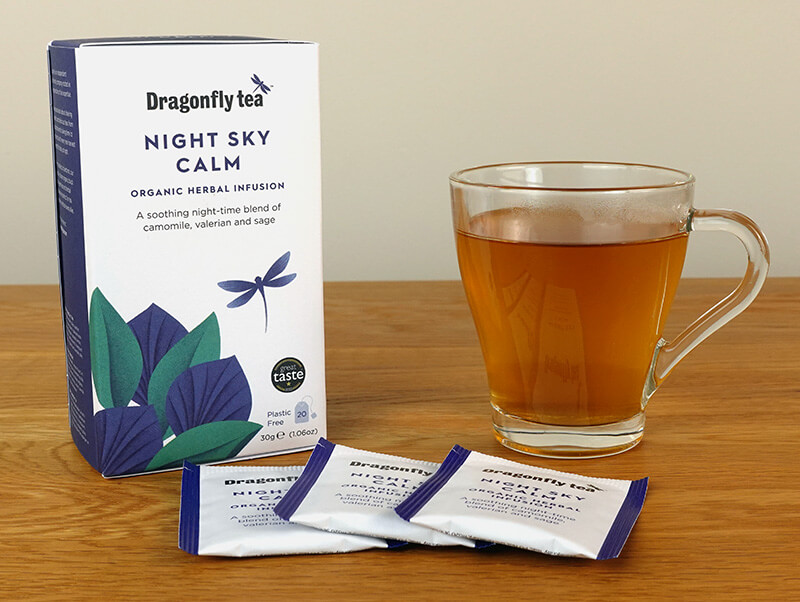
Ingredients
- Camomile
- Lemon balm
- Liquorice
- Honeybush
- Valerian
- Oatstraw
- Lavender
- Sage
Dragonfly Tea Night Sky Calm was one that surprised both of us. It has a kind of medicinal taste when you first sip it, with the valerian and sage coming across quite strongly. But then there’s a kind of sweet aftertaste that lingers in the back of your mouth and throat afterwards.
Some of the other teas have a similar effect, but none as strongly as this one. We couldn’t quite decide which ingredients were responsible for the delicious after taste. Whichever they are, they offset the medicinal side nicely, making it a lovely tea to relax with.
Dragonfly tea also make a couple of excellent mint teas if you’re looking for a digestive tea. And they also make one of my all-time favorite daytime teas, the superb Earl Grey and Rooibos blend.
I bought this one on Amazon. You can also find it in supermarkets and health food shops in the UK and some other countries, as well as the Dragonfly Tea website.
11. Nutra Tea Chamomile & Valerian
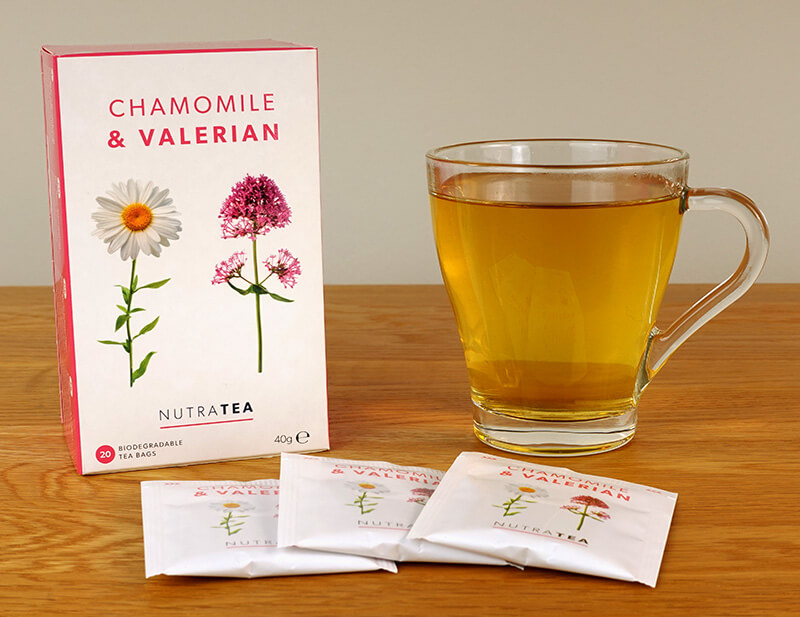
Ingredients
- Chamomile (85%)
- Valerian (15%)
In comparison to most of the other teas I’ve looked at so far, Nutra Tea only contains valerian and chamomile. Both the aroma and taste are therefore predictably strong, with no other ingredients to balance them out.
Personally, I preferred the teas that add a little sweetness, but if you’re a fan of chamomile and valerian, this is one to consider. The mix isn’t quite as strong as in some other chamomile and valerian focused teas I’ve tried, so you can still enjoy the tea without feeling it’s too much.
I bought it on Amazon, and haven’t seen it in any physical shops in the UK. You can find out more about it on the Nutratea website.
12. Teapigs Snooze Sleepy Tea
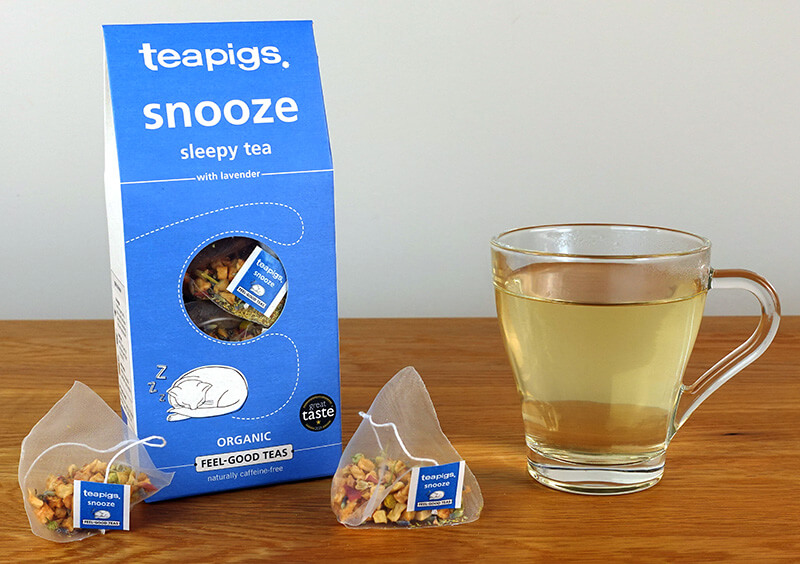
Ingredients
- Organic Apple Pieces (80%)
- Organic Chamomile Flowers (12%)
- Organic Lavender Flowers (8%)
Teapigs Snooze Sleepy Tea ended up in twelfth place only because the lavender was a bit too powerful for my palette. If you associate lavender with relaxation and enjoy the taste though, you may well love this tea.
From the second you pour hot water over the teabag, the unmistakable scent of lavender fills the air. It also contains apple pieces and chamomile, but they fade into the background with so much lavender floating around.
Even though it’s only listed as 8% of the ingredients, I found it provided more like 80% of the taste. So if you find lavender calming and enjoy drinking it at night, this is one to try.
I bought it in Sainsburys in the UK, and you’ll also find it in other supermarkets like Waitrose and Tesco. It’s also available on the Teapigs website and on Amazon.
What evidence is there that tea can help you sleep?
The bottom line is that there hasn’t been enough research into the sedative effects of the herbal ingredients in tea form to draw any firm conclusions. And studies of the ingredients in other forms, with higher quantities than typically found in tea, have found mixed results.
On a more optimistic note for bedtime tea lovers, there’s plenty of support among sleep experts for the idea that intentionally taking some time out to relax before bed can put you in the right frame of mind for sleep.
If drinking your favorite cup of herbal tea in the evening feels relaxing to you, perhaps even forming part of a relaxing bedtime routine, then that may be all the evidence you need.
Having said that, let’s take a look at some of the key ingredients in the herbal tea world. I won’t cover every ingredient listed in the teas above – just the most commonly found ones.
In the photo below, I’m enjoying the best part of my bedtime routine – a relaxing cup of tea and a good book. Bliss!
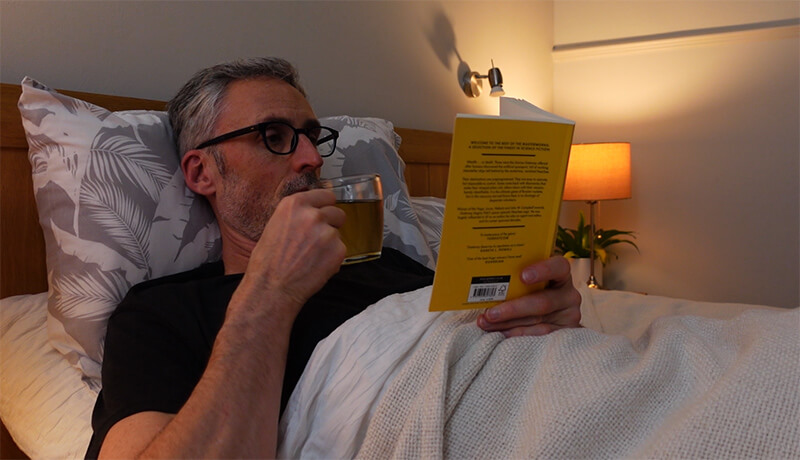
Chamomile
Chamomile is found in many brands of herbal tea, either alone or mixed with other plants. It’s in all twelve of the store bought teas I discussed above!
As for evidence that it works as a sedative, one review study in 2019 found that it helped with sleep quality, but not with the severity of insomnia.
Studies involving chamomile in actual tea form are very limited. One study in 2016 found that it helped postpartum women sleep better. However, after four weeks there was no difference between those and the control group who didn’t drink the tea. So they suggested that “the positive effects of chamomile tea were limited to the immediate term.”
Valerian
People is an ingredient in six of the twelve teas I tried. It’s one of the few plants which have been shown by researchers to help with sleep. However, a detailed review in 2018 of previous clinical trials found that the overall picture was one of inconclusive results.
Other researchers suggest it may work, but the problem is one of the clinical trials not being well designed. I haven’t found any research studies that used valerian tea specifically; they tend to be in larger dose supplement form instead.
Lavender
Although chamomile and valerian have long been two of the stars of bedtime teas, lavender makes an appearance in eight of the twelve teas I tried.
The evidence that lavender helps with sleep is mainly anecdotal though. I haven’t seen any evidence that it helps with sleep when drunk in tea. One review of eight studies using aroma inhalation suggested that it may provide a small to moderate benefit, but that more research is needed.
Interestingly, in a study in 2015, Taiwanese researchers found that lavender tea helped postnatal women feel less fatigued and depressed – but only in the short term compared to a control group.
Lemon balm
Like lavender, lemon balm has plenty of anecdotal evidence suggesting that it helps with anxiety, stress, or insomnia. It’s included in four of the teas on my list.
In a study in 2004, lemon balm was found to be associated with an increase in self-reported feelings of calmness.
One study in 2011 found some positive results when using a concentrated extract. But again, it wasn’t in tea form so the same effect can’t be guaranteed if you drink it – especially if it’s just a small contributor to a tea mix using several ingredients.
Passionflower
The passionflower is stunning when in bloom, alien almost with its complex design. Is the beauty of the flower mirrored in the quality of your beauty sleep though?
There is some research using it in tea form. In the study, 41 participants were given either passionflower tea or a placebo tea. The researchers found that those drinking the real tea had ‘short-term subjective sleep benefits’.
Spearmint and peppermint
In the past, I would only make myself a mint tea if my stomach was bubbling away uncomfortably after eating, but it’s also sometimes included in these herbal teas.
Despite a lack of research using mint in tea form specifically, animal studies have found that peppermint oil can help with indigestion and some other stomach complaints, and work as a muscle relaxant.
And in a study in 2020, using aromatherapy with peppermint was found to improve the sleep of cancer patients.
Teas recommended by previous readers
In the years since I first wrote this article, many readers have shared their favorite teas for sleep. With so many great suggestions, I’ve compiled the list below.
- Yogi soothing bedtime caramel.
- Lemon balm and skullcap combination.
- Chamomile Nights by Stash, with chamomile, spearmint and lotus.
- Chamomile mixed with Chinese tea.
- Lavender sun tea.
- Sleepytime tea mixed with chai white tea and Rooibos red tea.
- Chamomile steeped in hot water along with lemon verbena, with some lemon and sugar added.
- Brewing 10 sweet mint leaves in hot water.
- Sleepytime tea with vanilla.
- Triple Leaf Relaxing Tea (Chinese herbal tea).
- Linden leaves tea.
- Peppermint and chamomile tea combined.
- Tension Tamer.
- Tazo tea.
- Happy Nights tea by Carmencita.
- Nettle tea and Chamomile with a teaspoon of raw honey.
- Teavana’s Winterberry.
- Decaffeinated Earl Grey.
- Nighty Night.
- A concoction of the leaves of guava, taro and mulberry.
- Triple Leaf Relaxing.
- Ahmad Verbena (Vervain).
- Hibiscus tea.
- Dr. Stuart’s relaxation tea.
- David’s tea – Mother’s Little Helper.
- Morpheus from Tin Roof Teas.
- Teepee dreams from the Native American Tea Company.
What’s your favorite tea for sleep?
Which tea do you drink to help you relax as the sun sets and the moon rises? Do you think it has true sedative properties, or is it just the placebo effect working its magic Let me know your thoughts in the comments below.

I can go to sleep but cant stay asleep.. no sleep apnea after my sleep study..i just wake up all night
Hi Shelly
Thanks for your comment. Do you have an idea what it is that might have changed? Were you prescribed any treatment during the sleep study?
Regards
Ethan
Dr. Stuarts “Tranquility tea” is one of my all time favorites. The first time I tried it I doubted it would work…I woke up 5 hours later shocked because I didn’t even remember falling asleep. It definitely works. Sadly it’s based in England and doesn’t ship here (US) anymore. You can find it on Amazon but it is a bit more costly, but well worth it.
Hi Carrie
Thanks for your comment and suggestion. That’s a good tea, indeed. It’s a shame you can’t get hold of it easily!
Regards
Ethan
Are use a combination of Sleepytime and tension tamer. I am now very much concerned about celestial seasoning brand since I’ve seen several articles about high levels of pesticide would appreciate any comments on this thank you
Hi Pam
Thanks for your comment. There’s an interesting page on the Celestial Seasonings website responding to the accusations that their tea contains pesticides. And if you look online, you can find other articles that discuss this issue of the short-seller trying to lower the stock value of the company to make financial gains.
I guess it’s one of those situations where the consumer will find it difficult to impossible to know what the real truth is, so we’re left to make our own decisions based on what we can find published about the case.
Regards
Ethan
Can i have a glass of milk to fall asleep quickly?
Hi Lilly
Thanks for your comment. Milk is a good choice of bedtime drink, yes. It might not make you sleep, but for some people it’s a relaxing drink nonetheless that’s nice to drink before you go to bed.
Regards
Ethan
Hi Ethan! Thanks for sharing the info.
We are in Sweden have a tea “Sleep Now Tea”. It’s work by helping our body produce sleeping hormone.
Hi Suzana
Thanks for your comment and for sharing your tea idea.
Regards
Ethan
Teas I use : chamomile, mint, raspberry, seven blossoms, chamomile flowerslemon grass, filial, sleepiness tea by Celestial, and take calm chamomile.
Hi there
Thanks for your comment and for sharing these ideas. Sound like you have a very inviting tea collection!
Regards
Ethan
Within the last few months, out of no where, I have started kicking in my sleep. When I say kick, I mean my husband says that it’s like I am swimming, my legs are moving that fast. The blankets are a mess every morning now, and I am developing a lower backache from kicking so much. That being said, I must be getting a workout, because at times even my upper thighs ache. Was going to call the Dr. today after another marathon kicking spree last night, but I have a feeling that I will be prescribed a sleeping pill, and I want to avoid that. I am 52, had a complete hysterectomy in my mid 40’s with no hormonal therapy after. I love tea and would love some recommendations for something that might relax me enough to get a better nights sleep for myself and my husband.
Hi Linda
Thanks for your comment. I think it would still be a good idea to talk to your doctor about this, to rule out any physical cause or sleep disorder. Even if they do recommend sleeping pills, you don’t have to take them if you don’t want to.
Do you ever feel a burning, itching or other sensation in your legs when you go to bed or wake up in the night? Or do you feel more stressed or have had any major life changes recently?
Regards
Ethan
Hi Linda, This sounds like you suffer with the same problem as me, Periodic Limb Movement Disorder, I was diagnosed after a 48 hour sleep study, as I suffer from excessive daytime sleepiness due to lack of quality sleep ,the doctor tried me on a Parkinsons medicine and then an Epilepsy medicine, both of which made me feel horrible, so now I am trying to find a natural solution, which is what led me to look into herbal tea benefits. Thanks for the article Ethan.
I just started drinking looseleaf tea recently. Teavana’s Winterberry is the best herbal tea I’ve ever had. I don’t even need to put a sweetener in it. I’ve been sleeping like a baby every night since I’ve been drinking it for the past 2 1/2 weeks now. Love the article!
Hi AJ
Thanks for your comment and the suggestion – how great that the tea is helping you sleep so well! And it’s nice to hear you liked the article!
Regards
Ethan
Harvey and Sons Mothers Bouquet brewed extra strong puts me to sleep
Hi Prax
Thanks for the suggestion!
Regards
Ethan
I have tried the sleepy time tea and would like to comment that I think all who try these should do so in the daytime and see how they react. I became very depressed ( in a black hole, type of depression). I cannot tolerate St John’s Wort, Valerian or Chamomile , but would love to find a solution to my inability to fall asleep. I am on prescription drugs that are very addicting and am building up a tolerance. But please be aware of interractions like these! Thanks for all you do!
Hi Connie
Thanks for your comment. It sounds like you’re going to have difficulty using herbs to help you sleep if you are intolerant to those ingredients, though there are alternatives that don’t contain them. Have you had a good look at my section about sleep hygiene? There are loads of good tips in there and strategies for sleeping better that you might find useful.
Regards
Ethan
what are the dangers of kava kava…? just bought my mom a sleep tea that has organic kava kava, organic skullcap, etc. for her insomnia. would love to know your thoughts on if those 2 are safe….
Hi mp
Thanks for your comment. There’s a good article about the side effects of Kava Kava here that you might like to read.
It does appear that both kava kava and skullcap are still somewhat controversial, with a lack of conclusive evidence about how safe they are and what kind of problems they can cause, for who, and in what doses.
So my advice would be to have a read and see what you think.
Regards
Ethan
My nighttime tea of choice now is Fidnemed Nighttime Tea by mountain rose herbs
INGREDIENTS
Organic Lemon Balm, organic Hibiscus flowers, organic Skullcap, organic Passionflower, organic Hops flowers, organic Valerian root, and organic Lavender flowers.
It is a bulk loose tea and it is great.
Hi Diana
Thanks for your comment and suggestion. That’s a new one to me, so I’ll have to see if I can get hold of it.
Regards
Ethan
I like Revolution pomegranate white tea for bedtime.
Hi Abigail
Thanks for your comment and suggestion. It’s not a typical bedtime type of tea, so makes an interesting alternative for those who don’t like the classic ingredients.
Regards
Ethan
I just found out that chamomile is related to ragweed. I have been using Sleepytime tea for about a week, and I’m itching like crazy. Is there any nighttime tea that does not have chamomile?
Hi Patricia
Thanks for your comment. Sound like Chamomile definitely isn’t the one for you! Yes, you can get nighttime teas with it, such as valerian teas for example.
Regards
Ethan
Hi I’ve learned the same. Now looking for an evening tea alternative also :)
Tulsi tea has many medicinal properties as well as helping you sleep.
Are all these safe to drink while pregnant?
Hi Emma
To be honest I’m not an expert on herbs that are ok during pregnancy. But I just had a look into it, and found some sources saying some of these herbs should be avoided when pregnant. However, I also found some interesting articles saying that the recommendations change from source to source, so the best thing is to check with your own healthcare provider.
Regards
Ethan
I like to mix Neetle tea and Camomile with a tspn of raw honey. Does the trick for me. I also take a 2 tspn of Black Seed Oil. Black Seed Oil and Stinging Neetle are Big Pharmas worst nightmare.
Hi there
Thanks for the suggestion! I am going to add it to the list right now.
Regards
Ethan
I only have one kidney after kidney cancer. I’ve been using Sleepytime tea and just told by my internist that it has Valerian Root in it which can hurt your kidney something I try to be very careful of even with medications, vitamins and supplements. If I had known, it is not listed on the box.
Hi Patsy
Thanks for your comment. You’re right, it’s not listed on the box. There are so many possible interactions between herbal remedies and health conditions and medications, it’s not easy to keep track of. Your comment highlights how important it is to research carefully if you have any specific conditions. I also had cancer a few years ago, and since then am generally diligent about what I consume. Though once in a while I discover that yet another thing I’ve been eating or drinking is probably best avoided. It’s not easy, is it?
I wish you all the best.
Ethan
I was under the impression there are two types of Sleepytime tea. The regular one that we’re all familiar with and an “extra” version with Valarian root in it. (Which I’ve not found nor tried.) Do a search on their site for Sleepytime to see all the offerings under this blend.
I find that whenever I have trouble sleeping or just want to sleep easier, a combination of lemon balm and skullcap works wonders for me. Sometimes I’ll play around with it and add valerian or chamomile if I want the strength or flavour changed.
Lastly, I think the greatest benefit of all is how much it helps for sleeping when you have a cold, because I’m sure I’m not the only one who’s suffered a sleepless night thanks to a nasty cold. It turns out that lemon balm in particular has some interesting antiviral properties! I believe that in combination with other factors surrounding the tea (clearing the nose/throat) can make for much better sleep even through a nasty cold, because I can tell you it’s helped me!
Excellent post, by the way, Ethan. Cheers!
Hi Marko
Thanks for your comment, and the compliment – I’m glad you enjoyed the article. Thanks for your suggestion of the lemon balm and skullcap. I also think your point about using herbal tea to help with colds/congestion is a very valid one. It’s amazing how much a blocked nose and throat can mess up your sleep, so this is an interesting slant on the sleep tea debate.
Regards
Ethan
I have higgens and Burke honey and lemon tea does that help you sleep
Hi Dane
Thanks for the comment and suggestion!
Regards
Ethan
I’ve had most of the teas listed above both in the comments and the post. And, as a severe insomniac — I find the tea that helps me relax most is Chamomile Nights by Stash. Chamomile, spearmint and lotus. Used to love the Yogi Bedtime tea…but, I’ve been converted!
Thanks for the great tips on this site, by the way.
Hi Heather
Thanks for your comment, and I’m glad you found the site useful – that’s always good to know! And I agree that Chamomile nights is a good tea.
Regards
Ethan
Pukka sleepy time contains valerian, lavender, and lemon balm and I fell asleep so quickly!!
Hi Anya
Thanks for the suggestion!
Regards
Ethan
I used to have chronic insomnia, falling asleep was a very big problem, I used to cry on my bed sometimes when I can’t slp but now God being so good I tried chamomile tea and gosh I feel very relaxed and I sleep well too
Hi Laurette
Thanks for your comment. That’s great that the tea had such a positive effect for you!
Regards
Ethan
Found this site is really helpful. Thanks for your generous sharing. I have serious insomnia as sometimes i even can’t sleep for one second for entire day. I just came to know chamomile tea recently. I used to have gassy stomach too. So this tea solve my stomach problem too.
I mix chamomile tea with sleeping herbs powder prescribed by my doctor and plus diffusing the lavender essential oil. Most of the nights they work quite well. If too serious i will mix the tea with another chinese sleeping tea( sour date and so on).
Hi Jason
Thanks for your comment, and I’m glad you found the website helpful. It’s always good to hear from people who find tea does help them sleep. Which herb powder is it that your doctor recommended, out of interest?
Regards
Ethan
I drink lavender sun tea (no brewing). I find it very relaxing (can’t keep my eyes open) ;)
Hi there
Thanks for your comment. That’s another one I haven’t tried, and will have to give a go!
Regards
Ethan
Hi Ethan,
I have insomnia about twice a week. Avoiding technology in bed, complete silence , cool temperature, and chamomile teA do help me get good night sleeps.
want to try the ear plugs. How do you use them. Do you kinda screw them into your ear canals? See, it doesn’t stay in place so. Thought I would ask you.
Thanks for your blog, Ethan!
Hi Mimi
Thanks for your comment. Those are all very good ways to make sure you have the best chance of sleeping well. It depends which kind of earplugs you try. They all come with instructions for inserting them. But usually they are either squised and inserted, or gently squeezed into the right position.
Regards
Ethan
Hi I’m just curious will “diplomat very berry tea” aid in the help of other meds I’m currently on a very light sleeping tablet some nights they work so I take double doctor has allowed this but was thinking if I just had the one would the tea do the trick and help me relax more it’s caffeine free of course! Thank you xxxx
Hi Vanessa
Thanks for your comment. I’m not sure the tea itself would help you sleep, but if you find it relaxing to take some time out and enjoy the tea before bed, that relaxation can definitely help you sleep. I think one of the best things about drinking tea at night is the calming effect the ritual can have. Perhaps you can let us know after a few nights of trying it?
Regards
Ethan
Does just chamomile tea help you relax enough to let you sleep?? Cause I just bought a box of Bigelow Cozy Chamomile tea and am scared to try. This is my first time trying to get some sleep WITHOUT prescription meds.
Hi Allison
Thanks for your comment. Mmm to be honest, no it doesn’t unless I’m already quite tired. I don’t think a cup of tea on its own is enough to help me sleep. However, if I do all the other things which I know help me sleep, then a soothing cup of chamomile definitely helps the overall picture. My advice would be not to put all your hopes in the tea helping you sleep. But use it as a part of a relaxing bedtime routine, and practice healthy sleep habits and routines in general.
Regards
Ethan
I agree…it’s an enhancement to other things you do to sleep.
I have been taking ambient of sleep as well, but it is very hard on the liver..and I have cirrosis. Started drinking 8or9 Ozs of Sleepytime Extra – before bed and have slept great the past 3 nites!!! Tastes great and it works really fast. With no morning guilt or fogg. I also put my iPad next to my bed and type in “sleep inducing music insomniac so. You can choose from many different selections from rain, frogs (ect.) or music. Choose how many hrs as well. My personal favorites “inner peace”, “angelic music” or nature sounds. Good luck, do yourself and your liver a favor. Let me know.
Will non-peppermint mint tea help you sleep? For example, mint lime?
Hi Deanna
Thanks for your comment. I’m not sure to be honest! As with many teas, I think the main thing is if you find it helps you relax to sit down, take time out and enjoy the tea. Let me know what you find!
Regards
Ethan
Yogi soothing bedtime caramel. Tastes so good and puts you sleep quick.
Hi Jamie
Thanks for your comment – I agree that’s a lovely tea!
Regards
Ethan
Great article and accurate. As a fellow insomniac, I have drank the majority of these and they all help. I agree with a lot of people that the Yogi Bedtime tea works particularly well (and also tastes the best). What nobody mentioned is that Rooibos (red) tea is actually pretty effective at relieving insomnia symptoms. I actually prefer it to chamomile and lavender because it tastes so good.
Hi Daniel
Thanks for your comment and compliment – it’s good of you to say so!
I haven’t really considered Rooibos as a good tea for sleep. My dad drinks it regularly and has terrible sleep problems – maybe that’s why I never really though of it as something that helps! But you’re right in that many people, especially in South Africa, do regard it as a good tea to relieve stress and insomnia.
Regards
Ethan
Thank you for the article, Ethan! These are all teas I have tried – the Yogi Bedtime, by far, works the best for me. It calms my nerves and helps me sleep. Equally as wonderful for helping me relax and sleep is Lavender Tea. I happen to love the way it tastes. I believe all it contains is dried lavender. I get it at a tea shop called Cha for Tea. I’ve also had tea that is made of only passionflower, and that helps me relax fall asleep as well, but it doesn’t taste so great.
Hi Suzhen
Thanks for your comment and I’m glad you liked the article. I agree that passion flower can have a funny taste if it’s not mixed with others. I think it’s best with other flavors mixed in.
Regards
Ethan
I recently had to change my high-bloodpressure pill
The trial and error methods the doctor tried with the new pill as well as bodily symptoms gave me a a lot of concern.
This in turn lead to insomnia which leads to to shooting up of my hypertension.
The doctor says the insomnia is the culprit.
Please suggest herbsl teas to solve the sleep problem.
Thanks
Hi Tasneem
Thanks for your comment. Well, I’m not sure a cup of tea on its own is going to cure you of insomnia and the resulting hypertension, if that is indeed what’s causing it. My advice would be to look at the insomnia from a broader point of view. You might find it helpful to read my recent article about how I beat insomnia, which is full of good advice and tips you can try. I’d also perhaps try some relaxation techniques to help you sleep. But as far as teas go, you could always try with a chamomile and see if that helps you relax and unwind at night.
Does nighttime tea have to be hot to be therapeutic or can it be iced?
Hi Amy
Thanks for your question. I don’t think it really matters to be honest. As long as you find it relaxing, that’s the important thing. And if the herbs have sedative properties, hopefully they will still work. Perhaps you can come back in a week and let us know what you think!
Regards
Ethan
Good info…FYI, valerian root and kava kava raise blood pressure. That’s one of the risk.
Hi Demetria
Thanks for your comment, and for adding that information.
Regards
Ethan
Valerian decrease blood pressure.
I use Sleepytime tea But then I throw in A sprig of Sweet mint.
Hi Deb
Thanks for your comment. It’s a great idea to add a little touch of the real thing!
Regards
Ethan
The best I ever found was called Voodoo Mom Teas Sleep Happens from Chicama Run in Purcellville, Va. It contained Lemon Balm, Hibiscus Flowers , Valerian Root, Skullcap, Passionflower, Hops, &Lavender Flowers. It worked everytime. Last I heard they are out of business.
Hi William
Thanks for your comment. What a shame they went out of business with an amazing name like that!
Regards
Ethan
I’m Cuban and in my country the go to sleep king of all teas is the linden leaves tea(Te de Tiló) and surprisingly enough it wasn’t even mention in this article. In Cuba everyone knows that if you are having bad day and need to relax your grandma will make you some linden leave tea and the best part is that your don’t even have to buy it because it’s right in your backyard. I didn’t read this article to find out if tea helps you sleep or not, I’m reading this because it makes me go to sleep really fast and I wanted to know why and if there were other options out there, I’m not a big tea drinker. I recommend 100% the Linden leave tea to anyone who is looking for a relaxing tea. I’m famous at home for spending all night watching movies but since I started drinking linden tea at night after 25 minutes I’m in bed. Good luck !
Hi Dayan
Thanks for your comment. I didn’t know about that tea! It’s always fascinating to hear from other cultures and countries and the natural remedies they have passed down through the generations. I will look it up and maybe put it into the article!
Regards
Ethan
Hi Dayan, thank you for sharing i would like to try it. How can i buy that tea?
Where can I get it here in the states?
This seems very effective and wonderful!
Triple Leaf Relaxing Tea!!! It is a chinese herbal tea, that comes with 20 bags and is quite cheap compared to the others mentioned I get it from the asian supermarket and it has Ingredients:
Chamomile flower, Peppermint leaf, Catnip leaf, Blackberry leaf, Licorice root, Passionflower herb, Skullcap herb, Valerian root.
I really think This tea has all the perfect ingredients all around and works better than any of the others mentioned. Also it is cheap and has an affect similar to a sleeping pill! Dont go driving after drinking this one! but HIGHLY recommended for insomnia and Anxiety
Even though catnip makes cats go hyper and crazy apparently it has a sedative opposite affect on humans
Hi Jasmine
Thanks for your comment and interesting tea suggestion. You obviously rate that tea very highly, but it’s another I haven’t seen before. I’ll keep an eye out for it.
Regards
Ethan